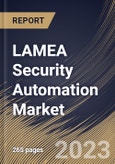As more organizations migrate to cloud environments, they need security automation to effectively manage and secure their cloud resources. Automation can ensure security policies and configurations are consistently applied across cloud environments. It can leverage machine learning (ML) and artificial intelligence (AI) to respond to advanced threats that may evade traditional security measures. These technologies can analyze patterns and anomalies in real-time data to identify potential security incidents.
Automated incident response workflows can help organizations respond to security incidents faster and more effectively. This can limit the impact of a breach and reduce the downtime associated with security events. The market constantly evolves, with vendors developing new and more sophisticated automation solutions. This innovation attracts organizations looking to stay ahead of emerging threats and improve their security posture.
The growth of the market is driven by the need for more efficient and effective cybersecurity solutions in the face of evolving threats, resource constraints, and increasing data volumes. It will become even more integral to an organization's cybersecurity strategy as technology advances.
Since introducing its Cloud First Policy in 2019 to accelerate cloud adoption throughout both public & private sectors, the Kingdom of Saudi Arabia has seen a 16% increase in cloud services. All the mentioned digital advancements of the regional industry verticals necessitate efficient security solutions. This is predicted to offer growth prospects for the market in the LAMEA region.
The Brazil market dominated the LAMEA Security Automation Market by Country in 2022 and would continue to be a dominant market till 2030; thereby, achieving a market value of $391.2 million by 2030. The Argentina market is showcasing a CAGR of 16.8% during (2023 - 2030). Additionally, The UAE market would register a CAGR of 15.9% during (2023 - 2030).
Based on Offering, the market is segmented into Solution, and Services. Based on Solution Deployment Type, the market is segmented into On-premise, and Cloud. Based on Solution Type, the market is segmented into Security Orchestration, Automation & Response (Threat Intelligence Automation, Incident Response Automation, Case Management Automation, and Others), Security Information & Event Management (Real-time Alerting Automation, Log Collection Automation, Incident Prioritization Automation, and Automated Incident Escalation), and Extended Detection & Response (Automated Threat Hunting, Real-time Response Automation, and Automated Compliance Reporting & Others). Based on Code Type, the market is segmented into Low Code, No-Code, and Full Code. Based on Technology, the market is segmented into AI & ML, Predictive Analytics, RPA, User Entity & Behavior Analytics, and Others. Based on Application, the market is segmented into Network Security, Endpoint Security, Incident Response Management, Vulnerability Management, Identity & Access Management, Compliance & Policy Management, and Data Protection & Encryption. Based on Vertical, the market is segmented into BFSI, Government & Defense, Energy & Utilities, Healthcare & Lifesciences, Media & Entertainment, Manufacturing, Retail & eCommerce, IT & ITeS, and Others. Based on countries, the market is segmented into Brazil, Argentina, UAE, Saudi Arabia, South Africa, Nigeria, and Rest of LAMEA.
The market research report covers the analysis of key stake holders of the market. Key companies profiled in the report include Palo Alto Networks, Inc., CyberArk Software Ltd., Check Point Software Technologies Ltd., Cisco Systems, Inc., IBM Corporation, Splunk, Inc., VMware, Inc., Crowdstrike Holdings, Inc., Fortinet, Inc. and Trellix (Symphony Technology Group)
Scope of the Study
Market Segments Covered in the Report:
By Offering- Solution
- Solution Deployment Type
- On-premise
- Cloud
- Solution Type
- Security Orchestration, Automation & Response
- Threat Intelligence Automation
- Incident Response Automation
- Case Management Automation
- Others
- Security Information & Event Management
- Real-time Alerting Automation
- Log Collection Automation
- Incident Prioritization Automation
- Automated Incident Escalation
- Extended Detection & Response
- Automated Threat Hunting
- Real-time Response Automation
- Automated Compliance Reporting & Others
- Services
- Low Code
- No-Code
- Full Code
- AI & ML
- Predictive Analytics
- RPA
- User Entity & Behavior Analytics
- Others
- Network Security
- Endpoint Security
- Incident Response Management
- Vulnerability Management
- Identity & Access Management
- Compliance & Policy Management
- Data Protection & Encryption
- BFSI
- Government & Defense
- Energy & Utilities
- Healthcare & Lifesciences
- Media & Entertainment
- Manufacturing
- Retail & eCommerce
- IT & ITeS
- Others
- Brazil
- Argentina
- UAE
- Saudi Arabia
- South Africa
- Nigeria
- Rest of LAMEA
Key Market Players
List of Companies Profiled in the Report:
- Palo Alto Networks, Inc.
- CyberArk Software Ltd.
- Check Point Software Technologies Ltd.
- Cisco Systems, Inc.
- IBM Corporation
- Splunk, Inc.
- VMware, Inc.
- Crowdstrike Holdings, Inc.
- Fortinet, Inc.
- Trellix (Symphony Technology Group)
Unique Offerings
- Exhaustive coverage
- The highest number of Market tables and figures
- Subscription-based model available
- Guaranteed best price
- Assured post sales research support with 10% customization free
Table of Contents
Companies Mentioned
- Palo Alto Networks, Inc.
- CyberArk Software Ltd.
- Check Point Software Technologies Ltd.
- Cisco Systems, Inc.
- IBM Corporation
- Splunk, Inc.
- VMware, Inc.
- Crowdstrike Holdings, Inc.
- Fortinet, Inc.
- Trellix (Symphony Technology Group)








